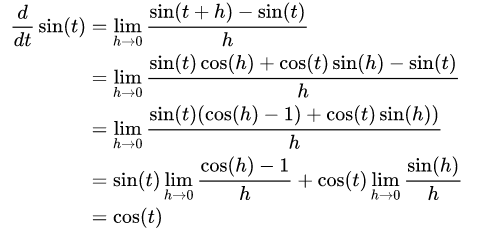Definition Of A Derivative And Degrees

Above shows the derivative of by the first principle.
What's the derivative of ?
This section requires Javascript.
You are seeing this because something didn't load right. We suggest you, (a) try
refreshing the page, (b) enabling javascript if it is disabled on your browser and,
finally, (c)
loading the
non-javascript version of this page
. We're sorry about the hassle.
The key to this problem is knowing that radians = (degrees * π)÷180.
If you have to take the derivative of sin(x) where x is in degrees, you're really taking the derivative of sin((π÷180) * x). Using the chain rule we have (π÷180) * cos((π÷180) * x), where (π÷180) * x is really x taken as degrees instead of radians, giving you the answer shown above.